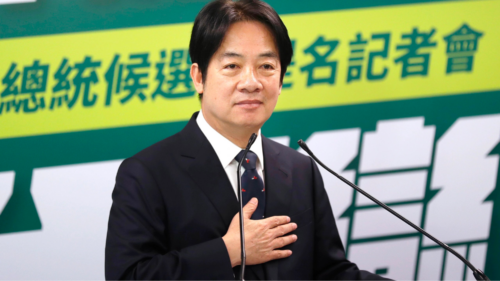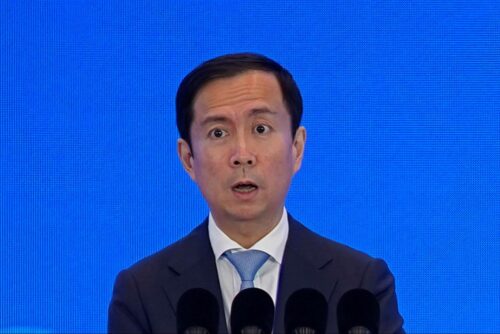Women now buy more suits than men — Alibaba
Dear Access member,
We send our condolences to our fellow China-watcher Bill Bishop, who recently lost his father.
A quick announcement: Please join us tomorrow, April 24, for a Slack chat with Oma Lee. Oma was recently selected as Young China Watcher of the Year. She will join us for a Q&A on the theme “China’s changing NGO landscape” at 11 a.m. New York time (11 p.m. Beijing time). Here’s a link to the Slack channel. Please email lucas@thechinaproject.com if you need help getting in.
—Jeremy Goldkorn and team
1. Women now buy more suits than men
In the last two months, China has been binge-watching the broadcast and streaming-TV series All Is Well (都挺好 dōu tǐng hǎo). It’s a family drama that stars Yáo Chén 姚晨. Jing Daily reports:
The series portrays the life of a typical Chinese middle-class family, which traditionally values sons over daughters, with women as “second-class” family members. Its storyline has particularly struck a chord with Chinese women through the protagonist Sū Míngyù 苏明玉 (acted by Yao Chen), who confronts the gender bias in her own family with fierce independence. Armed with a suit in every episode, Su Mingyu has dominated Chinese social media with her handsome suit styles and has led a national shopping trend for “women’s suits.”
But Chinese women’s interest in suits predates All Is Well. Jing Daily notes that in March, Alibaba released its 2019 China Fashion Data Report (in Chinese), which shows:
-
The top-searched keyword by female users of Taobao in 2018 was suit (西装 xīzhuāng). Searches for the term “大哥廓西” (dàgē kuò xī) — roughly meaning “dude’s padded-shoulder suit” — increased 317 percent year-on-year, while sales of such suits grew 39 percent.
-
The sales volume of women’s suits surpassed that of men’s suits for the first time on January 27, 2019. (Obviously, the data is drawn only from Alibaba affiliate websites and does not reflect brick-and-mortar retail sales.)
-
“Chinese men are embracing a more ‘feminine’ style” at the same time that women are buying powersuits. Jing Daily notes that “‘lace,’ ‘transparent,’ ‘earring’ topped the list of growing search keywords from men.”
2. Fears of a Red Army planet
Despite cautious but widespread optimism about a successful conclusion to the U.S.-China trade talks, deep tensions in the relationship persist. Two news stories illuminate — and will add to — worries in Washington about China, and fears in Beijing that America wants to stymie its rise:
-
“How China is replacing America as Asia’s military titan”
In the first of a series of reports on China under Xí Jìnpíng 习近平, David Lague and Benjamin Kang Lim of Reuters write that Xi “has refashioned the People’s Liberation Army into a force that’s rapidly closing the gap on U.S. firepower — and in some vital areas has surpassed it.” Their conclusion: “American victory over China in a regional war is no longer assured.”
-
China exploiting U.S. satellites “to strengthen police and military power”
The Wall Street Journal’s Brian Spegele and Kate O’Keeffe write (paywall) that Beijing is using commercial access to American satellites for a variety of military and security applications, despite U.S. law, and “aided indirectly by private-equity giant Carlyle Group and Boeing Co.”
Other stories on the tense bilateral relationship in the news today include:
-
Visa wars
US and China urged to stop ‘race to bottom’ in blocking academic visas / SCMP
Scholar Jim Millward: “It is the height of folly to demonize scholars in the way the FBI seems to be doing… Here’s the bottom line: you can’t combat threats to academe by posing more threats to academe.”
Opinion | When China and the US wage a visa war against each other’s scholars, nobody wins / SCMP
Scholar David Shambaugh writes about the rich history of the two countries denying visas to each other, and refers to the “recently escalating and reciprocal visa war” as “a new stage in the systematically deteriorating relationship.” He calls for both governments to “depoliticize scholarly visas.” -
Market access and foreign investment in China
MIIT hints at loosening restrictions on foreign tech firms for cloud services / TechNode
“With the new MIIT approval, foreign firms are expected to be able to set up joint ventures with local partners and conduct cloud-computing businesses. It gives foreign firms better access to China’s fast-growing cloud-computing market, but is still far from a free market.”
New China foreign investment law: Not good news / China Law Blog
The impression [many] commentators are giving is that China’s new Foreign Investment Law (FIL) will raise up foreign companies to become equal to Chinese companies…This is just not correct…The intent and the reality of the FIL is to pull down foreign investors to the status of privately owned Chinese companies. At that level, foreign invested companies will be firmly under CCP control and they will operate at a permanent economic disadvantage to PRC state owned enterprises.
3. An archive of harmonious tweets?
Sixth Tone reports on a new project to preserve postings on Weibo, China’s Twitter-like service used by nearly half a billion people:
The National Library of China will archive over 200 billion Weibo posts as part of a project launched Friday that aims to build a comprehensive record of internet data and preserve China’s digital footprint.
“The project is established for the long-term development of national information security and the informatization of society,” Ráo Quán 饶权, director of the NLC, said in a speech Friday. The project’s instigator and first partner, Chinese technology giant Sina, will contribute 210 million news articles and 200 billion Weibo microblog posts to the archive “for further research,” according to Rao.
Rao does not mention what the National Library will do with the many millions of Weibo posts that are censored each year. Will they be preserved for elite scholars to study, or expunged from the record as unbecoming to Xi Jinping’s New Era of Socialism with Chinese Characteristics?
—–
Our whole team really appreciates your support as Access members. Please chat with us on our Slack channel or contact me anytime at jeremy@thechinaproject.com.
—Jeremy Goldkorn, Editor-in-Chief
BUSINESS AND TECHNOLOGY:
-
Online education bubble is deflating
Bytedance’s tutoring platform Gogokid laying off employees / TechNode
“Bytedance’s online education platform Gogokid has reportedly laid off hundreds of employees, in the latest example of Chinese edtech firms tightening their belts in order to stay afloat.” -
The woes of Didi Chuxing
Didi dominates ride-hailing in China but loses money on many of its trips / WSJ (paywall)
“In an essay published this week, Didi executive Chen Xi said for every ride it facilitated in China in the three months to December, Didi lost on average 2 percent of the fare paid.” -
Wikipedia blocked
Wikipedia currently down in China / That’s Guangzhou
Although many individual pages on Wikipedia have been blocked for more than a decade, much of the English language version of the site has been accessible during that time. No longer it seems: “Wikipedia is currently inaccessible in China,” says That’s Guangzhou. -
Transparency in banking
This banking fraud shows how shady China’s economy remains / Foreign Policy (porous paywall)
Matthew Lowenstein writes, “The interstices of a tiny corner of the banking system — in industry parlance, the market for banker’s acceptance drafts — can serve as a proxy for the overall health of Chinese banking. They show that China’s financial system is not yet the transparent engine that its highest-level policymakers would like.” -
The anti-996 movement
David Paulk on Twitter: “Workers in China’s cutthroat tech industry who oppose the so-called #996 work schedule — 9 a.m. to 9 p.m., six days per week — are planning to mail #Alibaba founder Jack Ma a hard copy of China’s labor law.” Click here to read the whole thread. -
Huawei: Data privacy concerns
New Huawei P30 Pro found to be querying servers in China / Taiwan News
“The Huawei P30 Pro appears to have been purchased in Thailand and is running on a cellular network owned by one of the ‘top three mobile operators in Thailand,’ according to a post by the apparent owner on GitHub.” -
Guide to Chinese smartphone apps
Top Chinese apps of 2019 / What’s on Weibo
SCIENCE, HEALTH, AND THE ENVIRONMENT:
-
Pollution in Shandong
China reprimands officials in Shandong for failing to meet aluminium industry pollution cuts / Reuters via SCMP
“In a review of the compliance record of eight regions published on Monday, the [Ministry of Environmental Protection] said Shandong officials not only failed to meet guidelines on industrial overcapacity, but also deceived central government inspectors and tried to cover up illegal behavior.”
“Shandong’s provincial government said on Monday that 163 officials have been held to account for violations uncovered by central government inspectors.” -
Recycling plastic without China
China plastic waste ban throws global recycling into chaos / AFP via CNA
“From grubby packaging engulfing small Southeast Asian communities to waste piling up in plants from the US to Australia, China’s ban on accepting the world’s used plastic has plunged global recycling into turmoil.”
POLITICS AND CURRENT AFFAIRS:
-
Belt and Road complaints
Thousands protest China-backed mega-dam in Myanmar / SCMP
“The protest came just days ahead of a trip by civilian leader Aung San Suu Kyi to Beijing for a summit on China’s Belt and Road Initiative.”
Land not given to China for free in ECRL deal with Malaysia: Lim Guan Eng / Channel NewsAsia
“Malaysia’s Finance Minister Lim Guan Eng [林冠英 Lín Guānyīng] on Tuesday April 23 dismissed allegations that land was offered to China for free as part of a deal to reduce the cost of the East Coast Rail Link (ECRL).”
Bangladesh eyes alternatives to China’s Belt and Road loans as it seeks to fund future development / SCMP
“Bangladesh ‘never will’ ask China for more loans as it looks for ways to finance its future development, according to the country’s Minister of State for Foreign Affairs Mohammed Shahriar Alam.” -
A space for intellectual gatherings in Xi’an
China: A small bit of shelter / Pulitzer Center
Ian Johnson writes again about intellectuals in Xi’an, focusing on a public event space in the city named after the Socratic paradox “I know I know nothing” (知无知 zhīwúzhī). This event space (its Weibo page is here), Johnson writes, has “become China’s liveliest public forum.” The kinds of people Johnson met on a Saturday evening attending a talk there included:
A journalist who had lost his idealism but recognized it in Zhiwuzhi; an off-duty policeman curious about morality; a high school teacher upset by her students’ apathy; a successful entrepreneur who felt that society needed different voices in order to thrive.
-
See also: Johnson’s earlier piece on intellectuals in Xi’an and Zhiwuzhi, published on ChinaFile: ‘It’s hopeless but you persist’: An interview with Jiang Xue.
-
Naval diplomacy and the recent PLAN review
China shows off new destroyer as Xi views naval parade / Reuters via CNA
“China showed off the first of its new generation of guided missile destroyers on Tuesday (April 23) as President Xí Jìnpíng 习近平 reviewed a major naval parade through mist and rain to mark 70 years since the founding of China’s navy.”
Xi Jinping makes maritime peace call as Chinese navy powers up for 70th anniversary parade / SCMP
Note: In defense of Australia’s and other countries’ participation in the naval parade, the Australian Navy’s Sea Power Center tweeted:
Naval diplomacy (ND) is centuries old and not some ‘ceremonial luxury.’ At times when state to state communications fail, navies accommodate the gap in dialogue. Moreover, modern ND can be expressed in training, capacity building or HADR [Humanitarian Assistance and Disaster Relief]. It’s only limited by imagination…
-
Macau’s next boss
China’s top legislative body accepts resignation of Macau deputy Ho Iat-seng, paving way for him to become casino hub’s next leader / SCMP
China’s top legislative body unanimously approved the resignation of Macau deputy Ho Iat-seng [賀一誠 Hè Yīchéng] on Tuesday, in a move commentators said indicated Beijing’s blessing for him to succeed as the casino hub’s next leader. Ho, 61, who is also president of Macau’s Legislative Assembly, is expected to be the sole candidate in the chief executive [行政長官 xíngzhèng zhǎngguān] election in August.
-
China in Latin America
Bolsonaro took aim at China. Then reality struck. / Americas Quarterly
Americas Quarterly is a publication about “politics, business and culture in the Americas.” The above is part of a series of articles on China in the region. See also: -
Japan and China thaw
Trump not the only reason China is mending ties with Japan / Nikkei Asian Review
“Beijing aims to learn from Japan’s reaction to aging society.” -
Shantytown demolition and forced relocations
Chinese slum demolitions reveal government debt strains / FT (paywall)
“A massive scheme to demolish nearly 25m homes in designated ‘slum’ areas in China — forcing the relocation of some 100m people over the past four years — is straining local government finances amid a downturn in land sales.” -
Xinjiang and Uyghurs
Conference on the Uyghur human rights crisis / MIT-Harvard
A webcast of a conference on “the police state in China, where over one million innocent Uyghurs and other Turkic Muslims have been forced into concentration camps since 2016.” Speakers include Sean R. Roberts, Darren Byler, and Rian Thum. -
Falun Gong
20 years on, Falun Gong survives underground in China / AFP
Although Falun Gong is much reduced from its “heyday in China, where the group once boasted more than 70 million followers before it was outlawed in 1999,” the banned organization “has remained stubbornly persistent, even as practitioners in mainland China continue to face arrests and torture, according to rights groups.”
SOCIETY AND CULTURE:
-
Another singer lip-syncs a “live” show
Chinese actress Han Xue apologizes after lip-synching during musical / SCMP
Actress and singer Hán Xuě 韩雪, “who used a recording at a live musical performance in eastern China over the weekend has apologized after a public backlash.” -
A high-profile teen suicide
Teen’s death spurs parenting debate in China / SCMP
Video footage showing a 17-year-old boy jumping to his death from a bridge in Shanghai after his mother criticized him “over a conflict with his classmates” has sparked an online debate about parenting.
FEATURED ON SUPCHINA
Graveside poetry: Xiao Hong, Dai Wangshu, and the dead among us
Drawing from her experiences of war, poverty, and illness, writer Xiao Hong/Hsiao Hung 萧红 (1911–1942; given name Zhang Naiying 张乃莹) produced acclaimed novels such as Tales of Hulan River and The Dyer’s Daughter.
SINICA PODCAST NETWORK
Middle Earth #08: How to Make a Movie in 14 Days
Making a feature film can be a long and painful process — especially when you’re shooting an indie film in below-freezing conditions 16 hours per day for 14 days. But that is exactly what the creative team behind The Last Sunrise 最后的日出 was able to do. Along the way, it generated useful insights into China’s science-fiction movie scene and the realities of filmmaking in China on a shoestring budget. Featuring: Wen Ren, director, and Elly Li, producer and co-writer.
-
Subscribe to Middle Earth on Apple Podcasts, Overcast, or Stitcher, or plug the RSS feed into your favorite podcast app.






